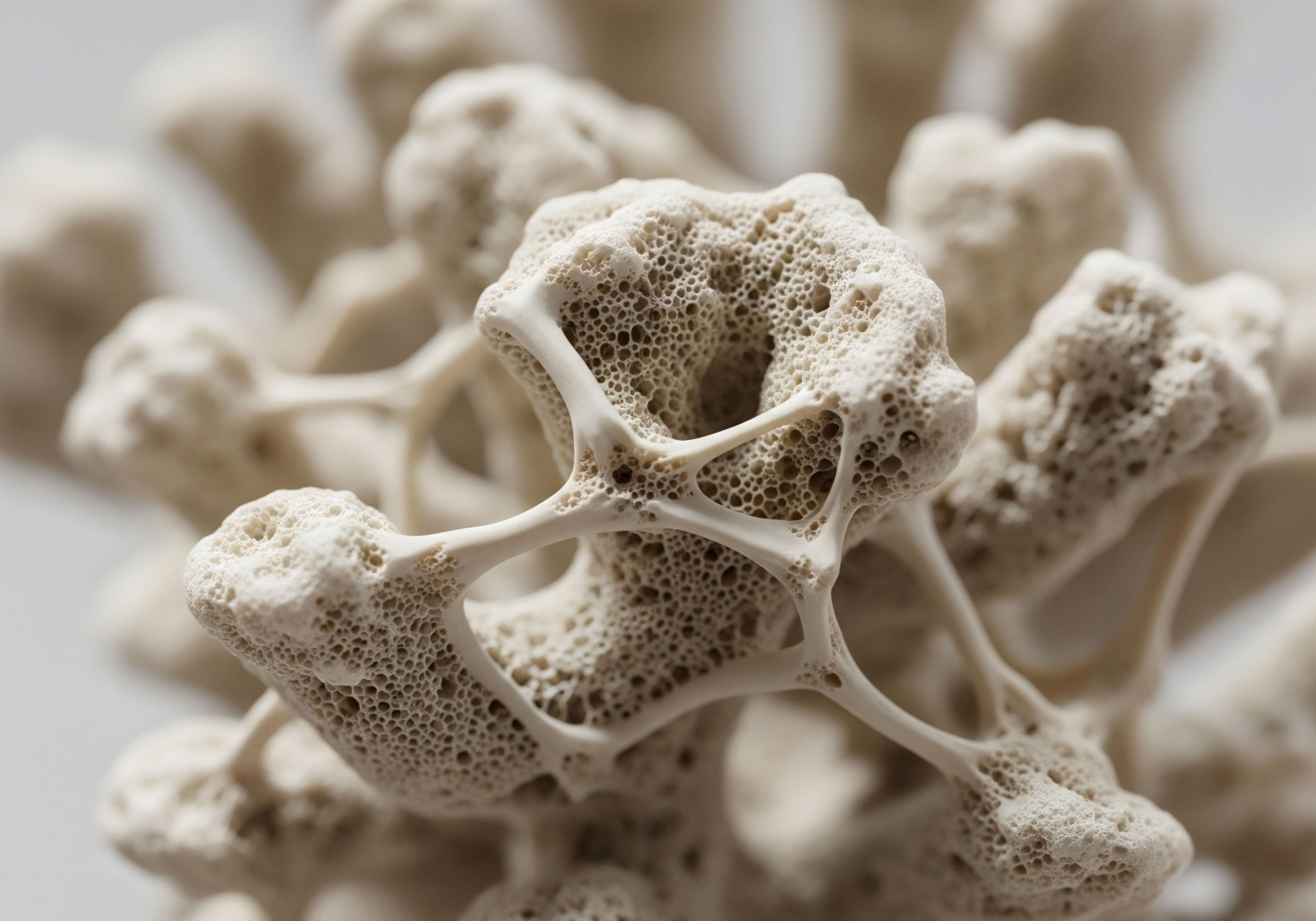

Fundamentals
Have you found yourself grappling with a persistent sense of low energy, a diminished drive, or perhaps a subtle shift in your physical and mental resilience? That feeling, which often feels like a personal failing, is frequently a whisper from your endocrine system signaling a need for recalibration.
It speaks to a deeper biological conversation occurring within your body, one that involves vital chemical messengers known as hormones. Among these, testosterone plays a central role, influencing not only aspects of vitality and sexual health but also metabolic function, mood regulation, and even bone density. Understanding how your body produces and utilizes this hormone is a powerful step toward reclaiming your full potential.
The body’s hormonal architecture operates as a sophisticated network, with intricate feedback loops ensuring balance. When we consider testosterone, we are looking at more than a single molecule; we are examining a key player in a complex orchestra of physiological processes.
Its production is not an isolated event but a carefully regulated cascade, beginning in the brain and extending to the gonads. This system, known as the Hypothalamic-Pituitary-Gonadal (HPG) axis, acts as the central command for hormonal output.
Reclaiming vitality begins with understanding the body’s intricate hormonal network, where testosterone acts as a central conductor.
Dietary choices serve as foundational signals to this delicate system. The foods consumed provide the raw materials and energetic cues that dictate how efficiently and effectively hormones are synthesized and regulated. A consistent pattern of nutrient deficiency or excess can send confusing messages, leading to suboptimal hormonal output. Conversely, a well-considered dietary strategy can support the body’s innate capacity for hormonal balance, allowing for improved function and overall well-being.

The Body’s Hormonal Blueprint
Testosterone, while often associated with male physiology, is present and essential in both men and women. In men, it is primarily produced in the testes, while in women, smaller amounts are generated in the ovaries and adrenal glands. This hormone is derived from cholesterol, making dietary fat a necessary precursor. The journey of testosterone synthesis involves a series of enzymatic conversions, each requiring specific cofactors ∞ many of which are obtained through diet.
The brain’s hypothalamus initiates the process by releasing Gonadotropin-Releasing Hormone (GnRH). This signal prompts the pituitary gland to secrete Luteinizing Hormone (LH) and Follicle-Stimulating Hormone (FSH). LH then travels to the Leydig cells in the testes (or theca cells in the ovaries), stimulating testosterone production. This intricate communication system highlights why a holistic approach, considering all inputs, is paramount for hormonal health.

Dietary Foundations for Endocrine Support
The concept of “dietary changes” extends beyond simply adding a single food or supplement. It involves cultivating a nutritional environment that supports the entire endocrine system. This means focusing on the quality and balance of macronutrients ∞ proteins, fats, and carbohydrates ∞ and ensuring an adequate supply of essential micronutrients ∞ vitamins and minerals. Each dietary component sends specific signals that can either promote or hinder optimal hormonal function.
Consider the analogy of a finely tuned machine ∞ if the wrong fuel is used, or if essential lubricants are missing, the machine cannot perform at its peak. Similarly, the human body requires precise nutritional inputs to maintain its complex biochemical processes, including hormone synthesis. The aim is to provide the body with the necessary building blocks and regulatory signals to allow its inherent intelligence to restore balance.


Intermediate
Moving beyond foundational concepts, we consider the specific dietary modifications that directly influence testosterone production and metabolic function. The goal is to provide your body with the optimal environment for endocrine system support, translating scientific understanding into actionable nutritional strategies. This involves a precise recalibration of macronutrient ratios and a targeted supply of key micronutrients.

Macronutrient Orchestration for Hormonal Balance
The balance of proteins, fats, and carbohydrates in your diet sends distinct signals to your hormonal system. It is not about eliminating any one group, but rather optimizing their proportions and sources.
- Dietary Fats ∞ Healthy fats are indispensable for testosterone synthesis, as cholesterol serves as the precursor molecule. Studies indicate a positive correlation between adequate dietary fat intake and circulating testosterone levels. Conversely, very low-fat diets can depress testosterone production. Prioritize sources of monounsaturated and saturated fats from whole foods.
- Protein Intake ∞ Protein provides the amino acids necessary for overall bodily repair and enzyme function, which indirectly supports hormone production. While adequate protein is vital, excessively high protein intake (above 3.4 g/kg of body weight per day) in low-carbohydrate contexts has been associated with decreased total testosterone. A balanced approach, ensuring sufficient but not extreme protein, is advisable.
- Carbohydrate Quality ∞ Carbohydrates influence insulin sensitivity, which in turn impacts sex hormone-binding globulin (SHBG) and free testosterone. Complex carbohydrates, such as those found in whole grains, vegetables, and fruits, support stable blood glucose and insulin levels. Refined carbohydrates, conversely, can lead to insulin spikes and resistance, potentially lowering SHBG and affecting free testosterone.
Optimal hormonal function relies on a precise balance of healthy fats, appropriate protein, and quality carbohydrates.

Micronutrient Catalysts for Endocrine Function
Certain vitamins and minerals act as essential cofactors in the enzymatic pathways involved in testosterone synthesis and metabolism. Deficiencies in these micronutrients can significantly impair the body’s ability to produce and utilize testosterone effectively.
| Micronutrient | Primary Role in Testosterone Metabolism | Dietary Sources |
|---|---|---|
| Vitamin D | Acts as a prohormone; receptors are present in Leydig cells, directly influencing testosterone synthesis. Deficiency is linked to lower testosterone. | Fatty fish (salmon, mackerel), fortified dairy, egg yolks, sunlight exposure. |
| Zinc | Essential for LH synthesis and secretion, which stimulates testosterone production.
Also inhibits aromatase, reducing estrogen conversion. |
Oysters, red meat, poultry, beans, nuts. |
| Magnesium | May reduce SHBG binding to testosterone, increasing its bioavailability. Involved in over 300 biochemical reactions. | Leafy greens, nuts, seeds, whole grains, dark chocolate. |
| Omega-3 Fatty Acids | Reduce inflammation, improve insulin sensitivity, and may directly influence testosterone levels. | Fatty fish (salmon, sardines), flaxseeds, chia seeds, walnuts. |

Addressing Metabolic Interconnections
The relationship between diet, metabolic health, and testosterone is deeply intertwined. Insulin resistance and obesity are strongly associated with lower testosterone levels. Excess adipose tissue, particularly visceral fat, contains aromatase, an enzyme that converts testosterone into estrogen, further contributing to hormonal imbalance. Dietary strategies that improve insulin sensitivity and support healthy weight management can therefore significantly impact testosterone levels.
A diet rich in whole, unprocessed foods, with a balanced macronutrient profile, helps stabilize blood sugar, reduce systemic inflammation, and support a healthy body composition. This approach directly addresses underlying metabolic dysfunctions that can suppress testosterone production.

Specific Dietary Protocols
While individual needs vary, certain dietary patterns align well with the principles of hormonal support:
- Mediterranean Diet ∞ This pattern, rich in healthy fats (olive oil, nuts, seeds), lean proteins (fish, poultry), and abundant fruits and vegetables, supports metabolic health and reduces inflammation, indirectly benefiting testosterone.
- Balanced Macronutrient Intake ∞ Aim for a distribution that includes approximately 25-35% of calories from healthy fats, 20-30% from protein, and 40-50% from complex carbohydrates. This general guideline provides sufficient building blocks without excessive intake of any single macronutrient.
- Whole Food Emphasis ∞ Prioritize unprocessed foods over highly refined options. Whole foods retain their full spectrum of vitamins, minerals, and antioxidants, which are vital for cellular health and endocrine function.
The integration of these dietary principles creates a synergistic effect, supporting not just testosterone production but overall systemic health. It is a commitment to providing your body with the precise signals it needs to operate at its peak.


Academic
A deep understanding of specific dietary changes that support testosterone production requires an exploration of the intricate biochemical pathways and systemic interplays that govern endocrine function. This section delves into the molecular mechanisms and complex feedback loops, drawing from clinical research to illuminate the precise impact of nutrition on the Hypothalamic-Pituitary-Gonadal (HPG) axis and peripheral hormone metabolism.

The HPG Axis and Nutritional Signaling
The HPG axis represents a hierarchical neuroendocrine system that regulates gonadal function and sex hormone synthesis. The hypothalamus releases Gonadotropin-Releasing Hormone (GnRH) in a pulsatile manner, stimulating the anterior pituitary to secrete Luteinizing Hormone (LH) and Follicle-Stimulating Hormone (FSH). LH then acts on the Leydig cells within the testes to synthesize testosterone from cholesterol. This tightly regulated feedback loop is highly sensitive to nutritional status and metabolic signals.
Energy availability and macronutrient composition directly influence GnRH pulsatility and pituitary responsiveness. Chronic low energy availability, often seen in restrictive diets or excessive exercise without adequate caloric intake, can suppress GnRH release, leading to a reduction in LH and FSH, and consequently, lower testosterone. This phenomenon underscores the importance of maintaining a sufficient energy balance, not just specific nutrient intake, for optimal hormonal health.
The HPG axis, a central command for hormone production, is profoundly influenced by the body’s energy status and nutrient availability.

Molecular Mechanisms of Micronutrient Action
The role of specific micronutrients extends beyond simple cofactors; they are integral to the enzymatic machinery and receptor signaling pathways involved in steroidogenesis.
| Micronutrient | Detailed Mechanism of Action | Clinical Relevance |
|---|---|---|
| Vitamin D | The Vitamin D Receptor (VDR) is expressed in Leydig cells. Activation of VDR directly influences the expression of genes involved in testosterone synthesis, including those for steroidogenic enzymes.
It also impacts calcium homeostasis, which is indirectly linked to testicular function. |
Supplementation in deficient individuals can significantly increase total and free testosterone. |
| Zinc | Zinc is a component of over 200 enzyme systems. It is essential for the synthesis and secretion of LH.
Zinc also acts as an inhibitor of aromatase, the enzyme that converts testosterone to estradiol, and 5α-reductase, which converts testosterone to dihydrotestosterone (DHT). |
Zinc deficiency is strongly associated with hypogonadism; supplementation can restore testosterone levels in deficient men. |
| Magnesium | Magnesium influences the binding of testosterone to Sex Hormone-Binding Globulin (SHBG).
It may reduce the affinity of SHBG for testosterone, thereby increasing the concentration of biologically active, free testosterone. It also plays a role in ATP production, vital for cellular processes. |
Higher magnesium intake correlates with better testosterone levels, particularly free testosterone. |
| Omega-3 Fatty Acids | These polyunsaturated fatty acids (EPA and DHA) modulate inflammation pathways (e.g.
reducing pro-inflammatory cytokines like IL-6 and TNF-α) and improve insulin signaling. Chronic inflammation and insulin resistance are known suppressors of testosterone production. Omega-3s also influence membrane fluidity, impacting receptor function. |
Supplementation can increase circulating testosterone, especially in overweight or obese individuals, and improve insulin sensitivity. |

The Gut Microbiome and Endocrine Crosstalk
An emerging area of research highlights the bidirectional relationship between the gut microbiome and sex hormone homeostasis. The gut microbiota influences testosterone levels through several mechanisms:
- Hormone Metabolism ∞ Certain gut bacteria possess enzymes (e.g. β-glucuronidase) that can deconjugate steroid hormones, affecting their reabsorption and circulation. An imbalance in these microbial populations can alter the enterohepatic circulation of hormones, impacting their bioavailability.
- Inflammation ∞ Gut dysbiosis, characterized by an overgrowth of pathogenic bacteria or a reduction in beneficial species, can lead to increased intestinal permeability (“leaky gut”). This allows bacterial products to enter the bloodstream, triggering systemic inflammation. Chronic inflammation directly impairs Leydig cell function and suppresses the HPG axis, reducing testosterone synthesis.
- Nutrient Absorption and Synthesis ∞ A healthy gut microbiome is crucial for the optimal absorption of essential micronutrients (like zinc and magnesium) and the synthesis of certain vitamins (like vitamin K), all of which are relevant to hormonal health.
- Insulin Sensitivity ∞ The gut microbiome influences host metabolism and insulin sensitivity through the production of short-chain fatty acids (SCFAs) and other metabolites. Improved insulin sensitivity, mediated by a balanced gut flora, correlates with healthier testosterone levels.

What Are the Complexities of Dietary Influence on Testosterone?
The dietary influence on testosterone is not a simple cause-and-effect relationship; it is a complex interplay of genetic predispositions, lifestyle factors, and individual metabolic responses. For instance, while high-fat diets are generally associated with higher testosterone, the type of fat matters significantly. Trans fats and excessive omega-6 fatty acids can promote inflammation, counteracting the benefits of healthy fats. Similarly, the impact of carbohydrates depends on their glycemic load and the individual’s insulin sensitivity.
Moreover, the concept of a “healthy diet” for testosterone is always contextualized by the individual’s current hormonal status and underlying health conditions. For someone with significant insulin resistance or obesity, dietary interventions aimed at weight loss and improved metabolic markers will likely yield more pronounced testosterone increases than for a lean, metabolically healthy individual. The clinical translator’s role involves synthesizing this intricate data, recognizing that personalized wellness protocols are paramount.

References
- Whittaker, J. & Harris, M. (2022). Low-carbohydrate diets and men’s cortisol and testosterone ∞ systematic review and meta-analysis. Nutrition and Health.
- Kataoka, T. Hotta, Y. & Kimura, K. (2021). A Review of foods and food supplements increasing testosterone levels. Journal of Men’s Health, 17(2), 4-14.
- Wrzosek, M. Włodarek, D. & Woźniak, J. (2018). The effect of zinc, magnesium and vitamin D on testosterone synthesis in men. Polish Journal of Sports Medicine, 34(3), 123-134.
- Pilz, S. et al. (2011). Effect of vitamin D supplementation on testosterone levels in men. Hormone and Metabolic Research, 43(3), 223-225.
- Dorr, R. & Kumar, S. (2023). How testosterone therapy can help men and women manage type 2 diabetes. European Association for the Study of Diabetes.
- Grossmann, M. & Matsumoto, A. B. (2017). A perspective on the roles of diet and exercise in the management of testosterone deficiency. Journal of Clinical Endocrinology & Metabolism.
- Ghasemi, M. et al. (2020). Micronutrients and sex hormones ∞ A systematic review and meta-analysis. Journal of Clinical Endocrinology & Metabolism.
- Xu, Y. et al. (2018). Testosterone-Associated Dietary Pattern Predicts Low Testosterone Levels and Hypogonadism. Nutrients, 10(11), 1762.
- Safarinejad, M. R. et al. (2011). The effect of omega-3 fatty acids supplementation on testosterone levels in infertile men. Andrologia, 43(1), 38-44.
- Pal, M. et al. (2019). Testosterone supplementation improves insulin responsiveness in HFD fed male T2DM mice and potentiates insulin signaling in the skeletal muscle and C2C12 myocyte cell line. PLOS One.

Reflection
Considering the intricate dance of hormones and the profound influence of dietary choices, one might pause to consider their own biological landscape. The knowledge shared here is not merely a collection of facts; it is a compass pointing toward a more intentional relationship with your body. Each dietary decision, each meal prepared, holds the potential to send a signal ∞ a message of support or imbalance ∞ to your endocrine system.
This journey toward hormonal optimization is deeply personal. It requires a willingness to observe, to understand, and to adapt. The insights into macronutrient balance, micronutrient roles, and the surprising influence of the gut microbiome serve as a starting point. Your unique physiology, your lived experiences, and your individual responses will guide the path forward.
Perhaps the most significant realization is that you possess the agency to influence your own vitality. Armed with evidence-based understanding, you can begin to recalibrate your internal systems, moving closer to a state of optimal function. This is not about rigid adherence to a prescribed regimen, but about cultivating a deeper awareness of your body’s needs and responding with informed, compassionate action.



